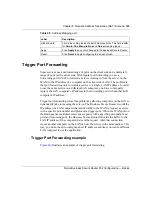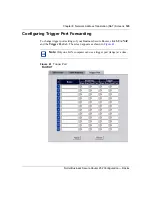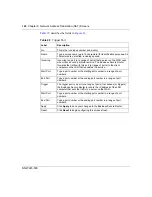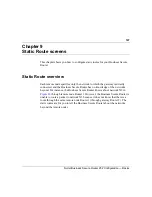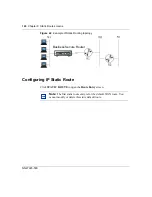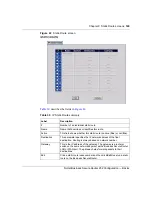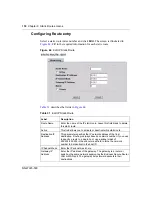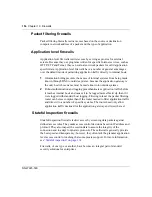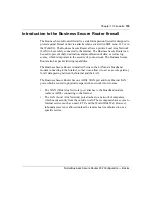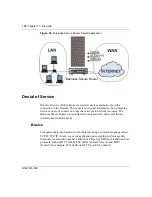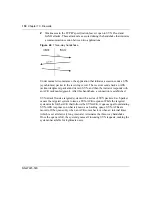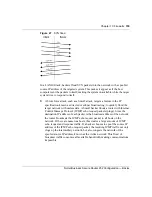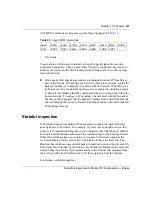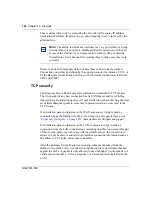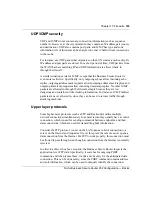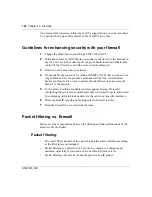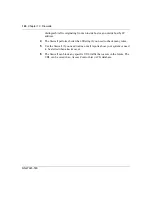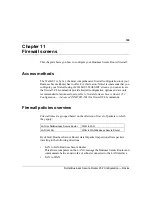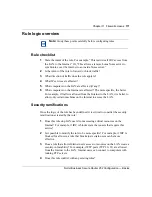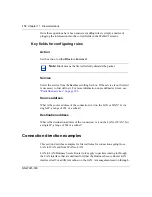
Chapter 10 Firewalls
157
Nortel Business Secure Router 252 Configuration — Basics
When computers communicate on the Internet, they use the client/server model,
where the server listens on a specific TCP/UDP port for information requests from
remote client computers on the network. For example, a Web server typically
listens on port 80. Note that, while a computer can be intended for use over a
single port, such as Web on port 80, other ports are also active and vulnerable to
attack by hackers.
Some of the most common IP ports are:
Types of DoS attacks
There are four types of DoS attacks:
•
Those that exploit bugs in a TCP/IP implementation.
•
Those that exploit weaknesses in the TCP/IP specification.
•
Brute force attacks that flood a network with useless data.
•
IP Spoofing.
1
Ping of Death and Teardrop attacks exploit bugs in the TCP/IP
implementations of various computer and host systems.
Ping of Death uses a ping utility to create an IP packet that exceeds the maximum
65 536 bytes of data allowed by the IP specification. The oversize packet is then
sent to an unsuspecting system, and can cause systems to crash, hang, or reboot.
Teardrop attack exploits weaknesses in the reassembly of IP packet fragments. As
data is transmitted through a network, IP packets are often broken up into smaller
chunks. Each fragment looks like the original IP packet except that it contains an
offset field that says, for instance, “This fragment is carrying bytes 200 through
400 of the original (non fragmented) IP packet.” The Teardrop program creates a
series of IP fragments with overlapping offset fields. After these fragments are
reassembled at the destination, some systems crash, hang, or reboot.
Table 32
Common IP ports
21
FTP
53
DNS
23
Telnet
80
HTTP
25
SMTP
110
POP3
Summary of Contents for BSR252
Page 28: ...28 Tables NN47923 500 ...
Page 44: ...44 Chapter 1 Getting to know your Business Secure Router NN47923 500 ...
Page 52: ...52 Chapter 2 Introducing the WebGUI NN47923 500 ...
Page 70: ...70 Chapter 3 Wizard setup NN47923 500 ...
Page 96: ...96 Chapter 5 System screens NN47923 500 ...
Page 114: ...114 Chapter 7 WAN screens NN47923 500 Figure 27 WAN IP ...
Page 120: ...120 Chapter 7 WAN screens NN47923 500 Figure 31 Dial Backup Setup ...
Page 128: ...128 Chapter 7 WAN screens NN47923 500 ...
Page 152: ...152 Chapter 9 Static Route screens NN47923 500 ...
Page 194: ...194 Chapter 11 Firewall screens NN47923 500 ...
Page 210: ...210 Chapter 13 VPN NN47923 500 Figure 67 Summary IP Policies ...
Page 222: ...222 Chapter 13 VPN NN47923 500 Figure 71 VPN Branch Office rule setup ...
Page 256: ...256 Chapter 13 VPN NN47923 500 Figure 81 VPN Client Termination advanced ...
Page 260: ...260 Chapter 13 VPN NN47923 500 ...
Page 264: ...264 Chapter 14 Certificates NN47923 500 Figure 83 My Certificates ...
Page 270: ...270 Chapter 14 Certificates NN47923 500 Figure 85 My Certificate create ...
Page 274: ...274 Chapter 14 Certificates NN47923 500 Figure 86 My Certificate details ...
Page 282: ...282 Chapter 14 Certificates NN47923 500 Figure 89 Trusted CA details ...
Page 298: ...298 Chapter 14 Certificates NN47923 500 ...
Page 316: ...316 Chapter 16 IEEE 802 1x NN47923 500 ...
Page 320: ...320 Chapter 17 Authentication server NN47923 500 Figure 106 Local User database edit ...
Page 328: ...328 Chapter 17 Authentication server NN47923 500 ...
Page 376: ...376 Chapter 20 Logs Screens NN47923 500 Figure 150 Log settings ...
Page 386: ...386 Chapter 20 Logs Screens NN47923 500 ...
Page 393: ...Chapter 21 Call scheduling screens 393 Nortel Business Secure Router 252 Configuration Basics ...
Page 394: ...394 Chapter 21 Call scheduling screens NN47923 500 ...
Page 410: ...410 Chapter 22 Maintenance NN47923 500 ...

